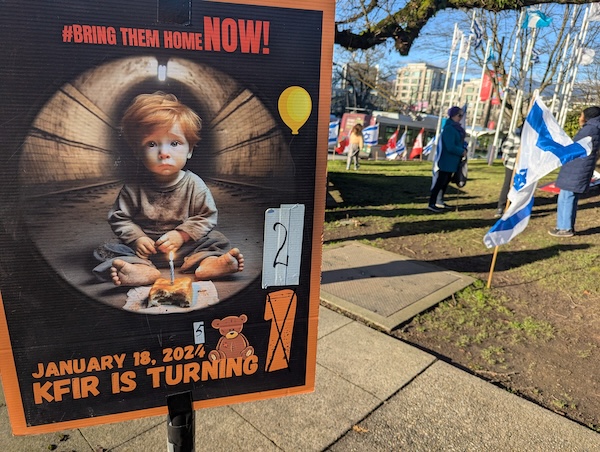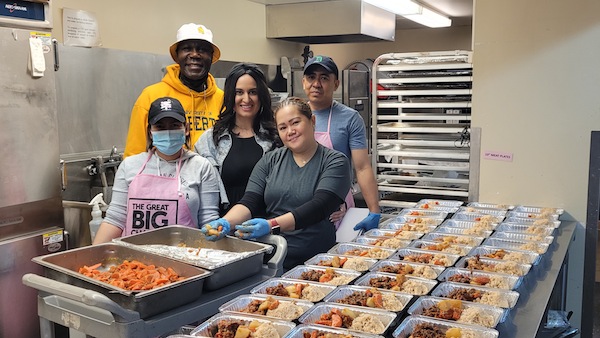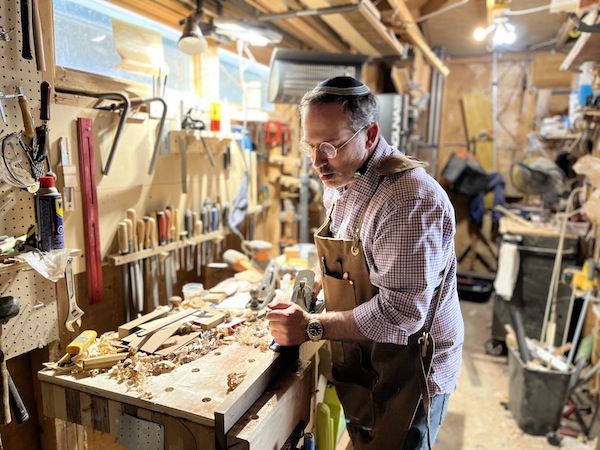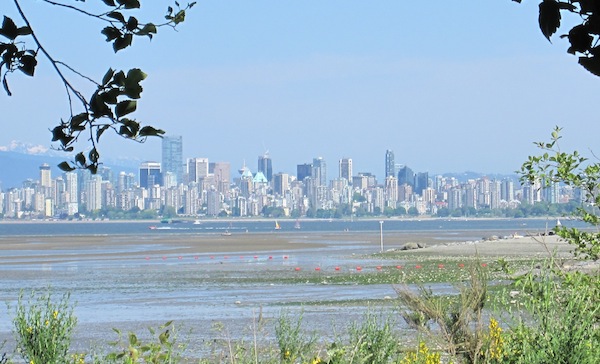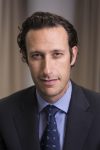Kfir Bibas was abducted before his first birthday. His second birthday is this Saturday. (photo by Pat Johnson)
The Gregorian calendar has turned over a new year, but the vigils for the Israeli hostages continue without interruption.
Daphna Kedem, who has organized the weekly events since hours after the Oct. 7, 2023, terror attacks, acknowledged that it has been effectively an additional full-time job and that the commitment has taken a toll.
“But it’s also given me energy to continue, in a strange way,” she told the Independent in the moments before the vigil at Vancouver City Hall last Sunday. “I have to be here. I have to do it. I can’t be anywhere else.”
Inevitably, numbers have dwindled from the initial weeks, and some people have suggested to Kedem that she alter the events from weekly to monthly to get the numbers up. She’s not confident that would make a difference and, she added, that would send a negative message. To shift from the weekly routine would imply “that we are normalizing and accepting the situation of the hostages” and that is a message she will not accept, she said.
Ari Mansell is a core volunteer who is present for setup and teardown every week, as well as occasionally playing violin.
“I come here as the smallest thing I can do to help my community,” he said. “It’s a labour of love for me. It’s hard for me to stay away.”
His participation has made him feel more connected to his community.
“I’ve increased my community around me,” he said. “Moving here eight years ago [from Edmonton], I didn’t really know anyone here. This unfortunate event has brought us together and I’m so thankful for the people that I’ve got to know over this time – the musicians, Daphna, the organizers – it’s enriched my life. I don’t do it for me, but at the same time it’s helped me.”
Joanita Nakasi is one of many Christians who attend on a regular basis. She has always prayed for Israel, she said, and so, when Oct. 7 happened, she felt moved to stand with the local Jewish community. She urges others to accompany her.
“They should also come and join,” she said. “We stand together until all our brothers and sisters are back.”
Richard Lowy, who has performed music and sung at many of the vigils, lauded the community for coming together across ideological lines.
“The idea that you’re secular, you’re religious, you’re nonreligious, you’re right-wing, you’re left-wing, you’re for Trump, you’re for Biden, you’re Jewish – it doesn’t matter,” he said. “It doesn’t matter what you think. When the Nazis came, they came for the Jews regardless of your beliefs or where you stood.”
He recounted an experience he had during the process of writing a book about the Holocaust experiences of his father, Leo Lowy, a “Mengele twin.” The book will be released on Jan. 27, which is International Holocaust Remembrance Day.
“While I was working [on the book], I’m reliving the horror of Auschwitz and looking at the faces of the people that are in this concentration camp and the families and the people that were brutalized and I had to take a break because it’s just so horrific,” he said. “As I walk out to the front, where the bike lane is, there is a group of young kids riding their bicycles with their Palestinian flags yelling, ‘From the river to the sea’ right in front of my house. It’s just so devastating to see this.”
In the cold sunshine Sunday, Jonathon Leipsic asked to be described solely as “part of klal Yisrael.”
Leipsic said he was asked to speak about antisemitism, but demurred.
“For me, antisemitism is a relatively irrelevant topic,” he told those gathered. “You may say have I lost my mind. What about this rising antisemitism?”
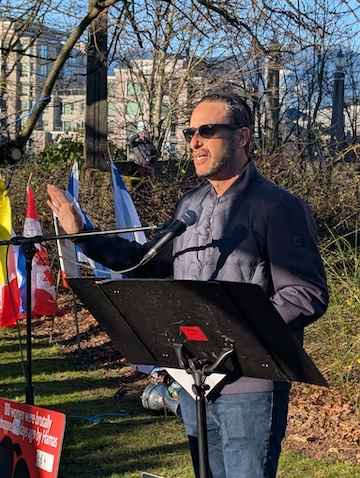
He said the Jewish community has done a good job teaching the next generations about antisemitism and the Shoah, to be good stewards of memory.
“We as a people undoubtedly will suffer, but we are eternal,” he said. “At the end of the day, we are eternal if we follow the words and the guidance provided to us.”
What worries him more, he said, is sinat chinam, baseless hatred.
“Baseless hatred among klal Yisrael and division and a lack of shalom bayit [peace in the home] within our people – this is, by far, and has always been, the only true threat to the eternity of am Yisrael. Our rabbis teach us that the First Temple was destroyed because of the most profound and abominable sins one could imagine that could be happening within a place of Hashem…. But yet, what brought down the Second Temple? Sinat chinam. Baseless hatred among klal Yisrael.”
He urged the audience to embrace the diversity of opinion within the community and “be less afraid of antisemitism and much more concerned about sinat chinam.”
Ohad Arazi moved to Canada from Israel in 2006 and has spent two decades bringing together Israeli and Canadian technology companies and people. As a son of a diplomat, he has spent more time living outside Israel than in it.
He reacted negatively when, prior to moving to Canada, his mother warned him that, as a Jew, “The only place you will ever feel truly safe is here in Israel.”
“I was so angry at her. I said, ‘I am a child of the world,’” Arazi recalled. “I am moving to one of the most liberal and pluralistic countries in the world. Please, Ima, don’t project your scarred Holocaust psyche on me.”
Then Oct. 7 happened.
“On that day, the world witnessed unspeakable atrocities as Hamas launched a brutal attack on Israel, resulting in the loss of innocent lives and the abduction of many,” he said. “But one more thing happened that day, which is that Canadians got their first glimpse of where our country could be headed. Shortly after the news of the scope of the atrocities began coming to light, revelers and anti-Israel protesters took to the streets in Canada.… Across governments, schools, unions and media, a toxic environment has emerged, fueling hostility against Canadian Jews.”
Israel’s war against Hamas, Hezbollah and the Houthis is proceeding successfully, he said. “But our war, as Jews in the diaspora, the war we are facing day in and day out, is a war of ideas, a war of words, ideology and truth,” said Arazi. “Our Canada should be the model for building a future where the values of humanity triumph over hatred and where every hostage is safely returned to their loved ones.”
Aliya Oran Dobres, a 15-year-old Grade 9 student at King David High School, shared her harrowing experiences of being pursued by a threatening group at a mall because of her Star of David necklace, as well as the threats her friends have experienced. In the days after Oct. 7, her fellow students covered their uniforms when in public, she said.
“We should not be scared for who we are,” she said. “As Jews, we must stick together and be strong.”
Ebube Anachebe is a fourth-year electrical engineering student at the University of Calgary, who is in Vancouver for an internship. She returned days ago from her second trip to Israel in the past year, with a Christian organization called Passages.
“The aim of the mission is to bring Christian students to the Holy Land to walk in the footsteps of Jesus,” she said. “However, since Oct. 7, they have been shifting their focus toward not just bringing students to the Holy Land, but also mobilizing Christian students to stand alongside their Jewish brothers and sisters against antisemitism.”
About 100 others joined Anachebe on the nine-day tour.
“We experienced the Jewish roots of our faith, we experienced the love of our saviour, gifted to us by you guys, our Jewish brethren,” she said. “We encountered modern Israel and we bore witness to the realities of what happened on Oct. 7.”
She shared several memorable encounters with Israeli individuals, including Shahar, a resident of Kfar Aza.
“His beloved community was torn apart and ransacked by Hamas terrorists. When we asked him why he returned, he said, ‘Israel is my home, this kibbutz is my home, I have nowhere else that I would want to go.’
“The group’s tour guide, Danny, recounted how, on Oct. 7, when awakened by sirens at 6:30 am, his son asked him, ‘Daddy, why won’t the bad people let Israelis sleep?’
“He shared about the difficult moment when, a couple of hours later, he was called to the reserves and he had to tell his son, ‘I won’t be here for your birthday tomorrow,’” Anachebe said.
She said that, when Oct. 7 happened, “it awoke two different camps of people.”
“It awakened the antisemites, who had been slumbering,” she said. “But I tell you it also woke up leaders who didn’t even realize that they were leaders until they were called up for such a time as this, to stand up against this evil of antisemitism. This is what I witnessed when I went to Israel. I witnessed leaders who will rise up and pray for Israel, the hostages and the brokenhearted.”
Anachebe said, “We Christians see you, our Jewish brothers and sisters, as mishpachah, family. We are standing and we are standing alongside you. Am Yisrael chai.”

